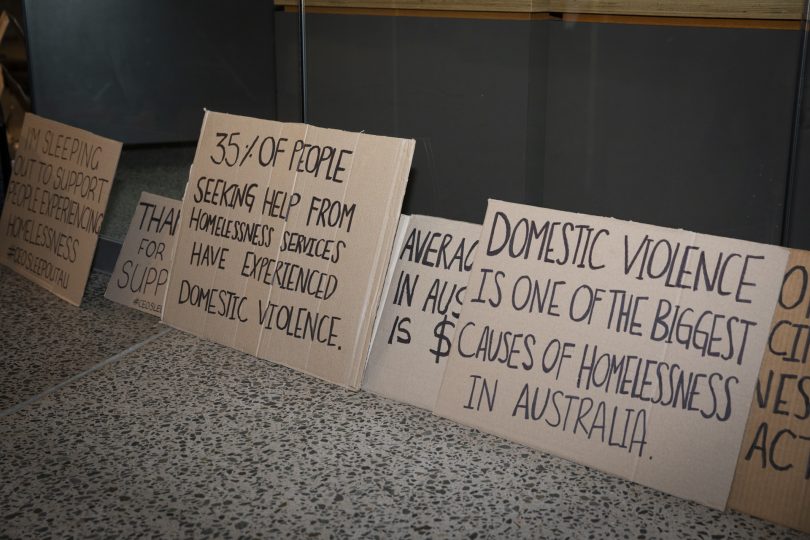
The Vinnies’ CEO Sleepout challenges many false perceptions around homelessness. Photo: Thomas Lucraft.
It’s mind-boggling that people are sleeping rough or begging for change in Canberra in 2021.
While the majority of us enjoy the gentle run down to Christmas, it’s hard to look past the forlorn figures crouched outside the Canberra Centre, cardboard signs propped up with their pleas for compassion.
But giving money to beggars isn’t always seen as a straightforward transaction, and I’m wondering what the consensus is out there as to the best action to take when it comes to helping strangers on the street.
There are two schools of thought on this.
The first is that people begging on the street should be able to access welfare, or otherwise should ‘get a job’ and support themselves.
If you give them money, they’ll ‘probably just spend it on drugs’, which would be adding to the problem, not providing them with some relief. The underlying assumption behind this attitude is that Australians are all equally able to support themselves or access support if needed, and that if an individual is reduced to begging on the street, it’s likely a self-created issue.
This obviously doesn’t take into account structural inequalities and barriers to education, employment and housing that affect many Australians.
The alternative approach (and the one I subscribe to personally) is that nobody chooses to be in the position where they’re sleeping rough or needing to beg for money. It’s unfair to assume that a) every beggar has a drug addiction or that b) people suffering from addiction don’t deserve empathy, agency and dignity. Addiction is an illness, and the drivers behind it are often related to broader issues like experiences of inequality, trauma, marginalisation and generational disadvantage.
Personally, I hand out cash to beggars regularly, sometimes as much as $50 at a time, because I am in a financial position where that $50 is not so essential to my well being that I can’t go without it, and I am acutely aware of the luck and privilege I have experienced that means my circumstances are so vastly different from the person I am walking past.
Some would say that giving money to beggars also reduces the onus placed on governments to take action.
I would argue that there is little correlation between whether or not you drop your change into an outstretched palm and how government policy addresses the issue of poverty and inequality. While there are clear broader implications of the existence of beggars beyond the individual, including how our welfare system operates, what crisis accommodation and support options are available to people in need, how mental health care and rehabilitation is made accessible to various parts of the community etc, there is also an immediate individual issue that I can affect right then and there.
In the moment, I know that giving that individual sitting outside the IGA $5 is going to make a measurable impact to their circumstances that day.
My lobbying the government, which is a valid and important thing to do, may have a lasting impact in the future, but it won’t make a difference right now. The two things are both impactful, in different ways.
As to the argument around where and how the money will be spent, personally, I don’t think that’s any of my business. I offer cash because I have it and someone needs it. It’s not up to me to dictate how it’s spent because being poor or unwell doesn’t mean you shouldn’t have agency and self-determination. If the person I give money to spends it on drugs, that’s their prerogative and choice, and not actually up to me to decide.
Similarly, I’ve had people say that they prefer to buy beggars a meal or hot drink. These same people are then offended when their offer of half a sandwich leftover from their lunch is rejected.
“I can’t believe he wouldn’t take the sandwich,” they exclaim. To which I reply, “Maybe he doesn’t like ham and cheese.”
Again, just because they’re poor or unwell doesn’t mean beggars should have to eat, drink or accept whatever is offered to them. They have tastes and preferences like anyone else. I give money because it means they can make that choice themselves.
As Christmas looms and spending increases accordingly, I’m even more aware of how much so many of us have in contrast to the suffering of those we walk past on our way to do our holiday shopping. I make donations to different charities throughout the year, and I know many Canberrans do so, especially at this time. But what about the individuals who are right in front of us? Should we give them cash to ease their burdens, or will we actually just be contributing to the problem?





















